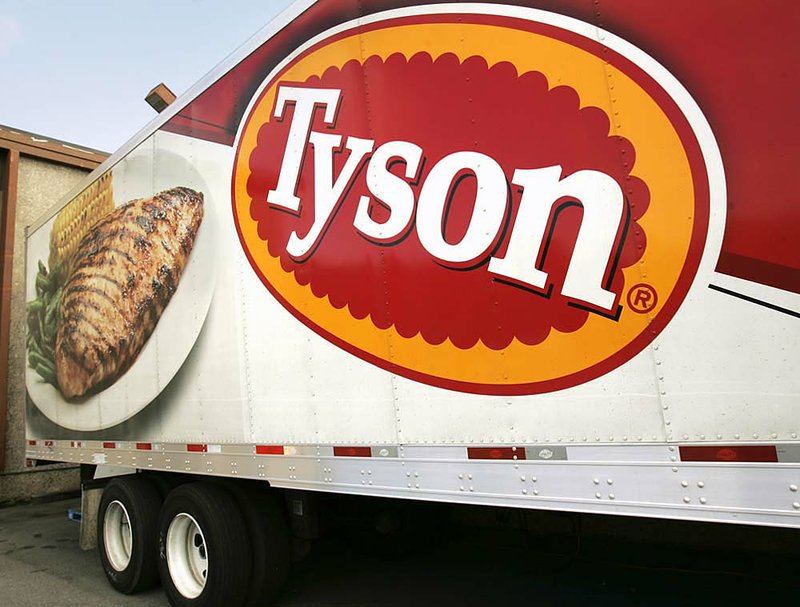Tyson Foods Inc. ended its fourth-quarter and 2010 fiscal year in the black. The Springdale-based meat giant Monday said increased prices helped reduce debt to levels not seen in the past decade.
Tyson posted net income of $213 million, or 57 cents per share, for the quarter that ended Oct. 2, compared with a net loss of $457 million, or$1.23 per share, for the same year-ago period. It topped the average earnings estimate of 56 cents per share from 15 analysts surveyed by Thomson Reuters.
Fourth-quarter revenue was $7.44 billion, which represented a 3 percent increase compared with $7.21 billion for the quarter that ended Oct. 3, 2009.
For the year, Tyson reported profit of $780 million, or $2.06 per share, compared with a net loss of $547 million, or $1.47 per share, in the 2009 fiscal year. Revenue was $28.43 billion for the 2010 fiscal year compared with $26.7 billion in the year ago period.
“Our number one financial focus is to get back to investment-grade,” said Donnie Smith, president and chief executive officer, in a morning media call, referring to bond credit ratings that place Tyson in noninvestment grade rating categories.
Both Moody’s and Standard & Poor’s, however, note a positive outlook as the business continues to repay debt and take other measures that improve its operating performance.
For the year, the company reported strong cash flows as helping it eliminate $1 billion in notes, which reduced Tyson Foods’ gross and net debt“to its lowest level in nearly a decade,” according to news release.
Acquisitions such as a $21 million, Chinese poultry operation in August 2009; a $67 million acquisition of Brazilian poultry operations in October 2008; and a $4.7 billion purchase of IBP, a South Dakota-based meat packer, in 2001 have added debt, but have also helped growth. Tyson became the country’s biggest provider of pork and beef along with chicken as a result of the IBP deal, for example.
The meat marketer operating four business segments reported a 34 percent decrease in long-term debt.
Shares of Tyson Foods Inc. rose 96 cents, or 6.14 percent, to $16.60 per share on the New York Stock Exchange. Its shares have traded as high as $20.57 per share and as low as $11.94 per share over the last year.
Each Tyson reporting segment, except for chicken, posted increased sales and improved, year-over-year prices.
The chicken segment reported a slight decrease in sales at $2.62 billion, as the segment remained fairly stable in both volume and price. Tyson,however, posted a $29 million goodwill impairment charge related to its Brazil operations in part because of its lackluster financial performance, industry insiders said.
Tyson’s pork segment reported $1.26 billion in sales, as quarterly prices rose 42 percent, even though overall product volume fell. Market watchers say pork prices were aided by low supply and rising demand from fast food chains advertising new breakfast offerings.
The beef segment saw a small boost at $3.04 billion in fourth-quarter sales, as prices rose 14 percent. Last year, beef posted a $560 million charge for the impairment of goodwill. The write-down was a significant contribution to its difficult, year-ago period.
Tyson supplies McDonald’s Corp. and about 13 percent of its 2010 consolidated sales were made to Wal-Mart Stores Inc. of Bentonville. It employs about 97,000 people in the United States, 30 percent of whom are represented by a collective bargaining agreement. Another 18,000 people are employed in China, Mexico and Brazil, and about 39 percent are represented by a collective bargaining agreement.
To contact this reporter:
Business, Pages 23 on 11/23/2010
